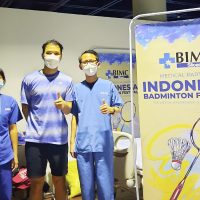
It’s not just being outdoors in Bali where we can find injury, accidents can happen in your home or villa when you least expect it. When it comes to health and safety, especially for those with young children, it makes good sense to know exactly what to do in the event of a home accident.
1. Falling objects
Being conscious of your child’s health means ensuring any long electrical leads, table edges and kitchen towels are out of reach and not able to be pulled to the floor, which often means along with the entire tabletop.
2. Burns
Hot drinks are the source of most burns and scalds; children should be kept a safe distance from barbecues, stovetops, irons and lighters. A burn to the skin should be treated with ice. Having plastic film in your first aid kit can also be used to cover burns and keep them clean.
3. Choking
If your child is under a year old, turn his/her facedown over your forearm or on your lap if you can’t manage the forearm position. Hold your child’s jaw with one hand to support the head, which should be lower than his/her chest.Using the heel of your free hand, deliver five quick slaps between the shoulder blades.
If your child still can’t breathe, try chest thrusts: While holding your baby, turn his/her faceup, keeping thehead lower than the chest. Place two fingers in the middle of your child’s chest and give five thrusts. Repeat with back blows and chest thrusts until the object is visible and you can remove it.
If your child is older than one year old, stand behind him/her with your arms around her waist. Make a fist with one hand, placing the thumb side against the child’s stomach above the navel, but below the rib cage.Grasp the fist with your other hand and quickly thrust inward and upward. The Red Cross recommends alternating abdominal thrusts with back slaps to try to dislodge the object.If your child becomes unresponsive, perform CPR and/or call BIMC emergency.
4. Shattered Glass
Broken glass can cause serious cuts.Think closely before purchasing tables made of glass and be sure doors and shelving conform to safety standards. Large glass walls in villas can often create an illusion of an open entry until one walks into it head first. Place stickers or frosted decals on glass walls and doors for this safety purpose.
5. Drowning
Young children can drown in very shallow water and they should therefore be supervised at all times when near pools,villa reflection ponds, water features and even baths. Despite the swimming ability of your young ones, consider erecting a safety fence around the perimeter of your pool until children are aged six years and above.
6.Fire
A simple fire extinguisher from ACE Hardwarecould be the most valuable purchase you’ll make all year. Bali houses and villas may be constructed of mostly cement but many have enough wood trim and paint that can ignite into a toxic hazard that can spread quickly.
7. Cuts
Any cut means there will be blood, and this can be one of the most difficult issues involved in first aid for children. Apply pressure to stop the bleeding and apply an antiseptic to the area afterwards. Assessing the situation is important:normallyif the blood stops following pressure, it is likely to be a minor cut that will not need stitches.
8.Electrical Safety
Do not use appliances with worn or damaged cords and keep portable appliances out of the bathroom. Furthermore, if an appliance appears broken stop using it and have it fixed. Look for the CE mark when you buy electrical equipment and never overload an electric socket, as is so often the case in Indonesia.
9.Cooking
If you suspect a gas leak from the changeable LPG cylinders, open the windows, turn off the supply and call your local gas “tukang” or a Pertamina reseller. And don’t operate switches as a spark could ignite the gas.
10.Safety with Medicines and Cleaners
Consider building a proper lockable cabinet fitted in the kitchen for medicines and chemicals; and keep medicines in their original containers and do not take other people’s medicine, or let them take yours.
Sources: Parents.com; Prevention; Clean Cooking Stoves; Kids health











